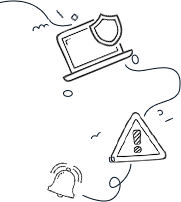Introduction
In the whimsical world of the internet, safeguarding your personal details is as important as keeping your cat’s embarrassing photos off social media—because no one wants to see Fluffy in that ridiculous hat! A significant component of online data privacy involves keeping sensitive personal information, such as your home address and Social Security Number (SSN), tucked away like your favorite snacks during a movie marathon. But what happens when a cyber villain sets their sights on your personally identifiable information (you know, the stuff that sounds all official and scary)?
Enter doxxing, the modern-day equivalent of posting your report card on the school bulletin board (but way worse). Approximately 11 million Americans have had the unfortunate honor of being doxxed. Sounds terrifying, right? Let’s dive into this digital dilemma and arm ourselves with knowledge!
What Is Doxxing?
This cybercrime is akin to flinging someone’s embarrassing childhood photos into the public arena—only instead of “Oh, look how cute you were,” it’s more like “Yikes, why is your address here?” Doxxing occurs when someone unfriendly posts your private information online without your permission, turning your life into a real-life horror flick.
The types of sensitive information that might make an appearance include:
- Full name (so much for hiding behind that username!)
- Home address (yes, they want your Netflix password too)
- Phone numbers (don’t expect a nice call from your aunt)
- Email addresses (hello, spam city!)
- Workplace or employer details (guess where they’ll show up to protest?)
- Social Security numbers and similarly sensitive data (the crown jewels of personal info)
- Private photos or documents (and not the good kind)
Essentially, once a doxxer has your information, they can engage in all sorts of delightful activities,… like harassing, intimidating, or threatening you, both online and off. Do you really want your biggest nemesis to suddenly have the keys to your life? Probably not!
Doxxing High-Profile Individuals
It seems that nowadays, corporate executives are becoming the latest victims of doxxing, especially when their decisions—like asking everyone to return to the office after a lovely work-from-home retreat—stir the pot. Who knew that corporate policies could get a CEO’s address leaked like a sensitive sequel spoiler?
In scenarios like this, an executive’s personal information (yes, including their nightmarish work-from-home attire) can end up online, circulating through sites like Reddit, 4chan, or even your Aunt Karen’s Facebook. Accompanying these data drops can often be delightful calls to action, urging people to not just share jokes, but also to harass the poor executive or organize protests outside their home. While politicians have traditionally been the favored targets, it seems that corporate leaders are now joining the club of the digitally persecuted.
When such doxxing happens, companies scramble to enhance their security, perhaps even wrap their execs in bubble wrap, and hire cybersecurity experts faster than you can say “data breach.” The targeted individual may need to retreat from public life, and the company might launch an internal investigation to prevent another oopsie-daisy. Updates to executive protection protocols and employee privacy training quickly follow—because nothing says ‘we care’ like a thorough workshop on keeping your head down.
And let’s be clear, it’s not just the big wigs who are being doxxed; your average Joe-schmoe can be caught up too, often after a trivial internet spat. So, tread carefully, folks!
Staying Safe
As doxxing becomes more of a trend than wearing socks with sandals, it risks triggering cyberattacks, reputational damage, and even invites unwelcome real-world threats. Once someone throws your information to the winds of the internet, you never know who’s saved it or who turned it into a meme!
So, how do you avoid becoming the next headline? Avoid oversharing on social media. Yes, that means keeping your full name, birthday, address, school, and workplace private—like your secret collection of action figures! Set your profiles to private and routinely check your followers or friend list to weed out any rogues. Remember, your posts are public; if you wouldn’t tell it to a random person at the grocery store, don’t shout it online!
And just a little heads-up: your photos may contain metadata that reveals when and where you took them. Posting a lot of snaps can inadvertently form a roadmap for those determined digital stalkers.
Here are some handy safety tricks:
- Enable multi-factor authentication (2FA) on all accounts. It’s like a secret handshake but for your online safety!
- Use unique, strong passwords—so strong you might need a superhero cape to remember them, and a password manager can help!
- Avoid using your real name or primary email for public forums—think of a fun pseudonym instead (how about Captain Internet Shield?).
And if you find yourself having the unfortunate revelation that you’ve been doxxed, document everything like you’re collecting evidence for a true crime podcast, and report it to the platform where your data was published. They should have measures in place to help you out. In dire situations, don’t hesitate to involve law enforcement if you feel threatened.
Conclusion
Many places have made doxxing illegal, especially if it comes with threats, stalking, or the release of information that can lead to harm. Laws may vary by country and region, kind of like your weird uncle’s holiday traditions, but usually, doxxing falls under cybercrime or privacy violation statutes.
So, keep that private information locked up tighter than your grandma’s secret cookie recipe, and report anything suspicious that pops up online like it’s the world’s worst party crasher! As doxxing continues to lurk in the shadows of the internet, it’s crucial for all of us to guard against sharing too much in a digital world where people can take your information and run with it—often to places you’d rather they didn’t go.
The post Doxxing: What You Need to Know About this Cyber-Threat appeared first on Cybersafe.




